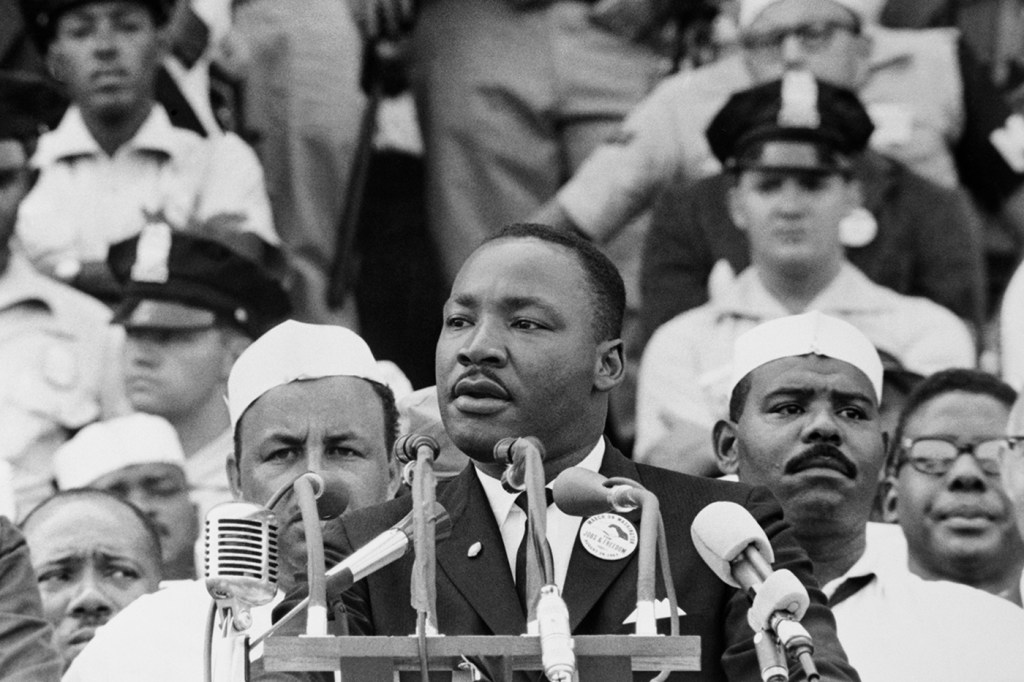A call to recover Martin Luther King Jr.’s radicalism

Each year, the annual Martin Luther King Jr. Day seems to come at a time when the nation is in deep reflection, contemplating everything from the news of the moment, to the meaning of the annual holiday itself.
This year’s celebrations at Northeastern focused on the latter. The university’s annual event, “A Tribute to the Dream: Voting Rights and the ‘Threat to Justice Everywhere,’” was streamed on Facebook on Monday. An array of presenters offered remarks on the occasion and explored the ways the civil rights icon’s message persists amid the turmoil of the present, as well as continues to inform the work of civil leaders, academics, and others.
King’s memorable “I Have A Dream” speech, said Joseph E. Aoun, president of Northeastern University, “knew no national boundaries.”
“Neither do racism and intolerance,” he added, calling on everyone to combat rising “racial injustice.”
“Each one of us can contribute to building a more just and inclusive society,” Aoun continued. “A society strengthened by our diversity of identities and experiences, and enlightened by opportunity for all.”
Kicking off the program, former Huskies basketball player and electrical engineering alum Kwesi Abakah sang “A Change is Gonna Come.” MBA candidate Gabriela Taveras hosted the event.
Kristen Clarke, assistant attorney general for civil rights at the U.S. Department of Justice, delivered the keynote address. She spoke about King’s legacy, touching on how his message is spurring the federal department’s civil rights work. That includes efforts to combat hate crimes, improve the criminal justice system, protect fair housing opportunities, and safeguard voting rights.
“His voice has become even louder and more urgent over recent years,” Clarke said, of King. “We’ve seen our nation face unprecedented struggles. A pandemic turned our society upside down and took the lives of more than 800,000 of our fellow Americans; a racial reckoning on the streets of America united millions in calling for reform of our criminal justice system; and a violent attack on our nation’s Capitol shocked us all as we watched an unprecedented attack on our democracy.”
Régine Jean-Charles, an Africana Studies professor and author of the book A Trumpet of Conscience for the 21st Century: King’s Call to Justice, sat down with Northeastern law scholar and renowned civil rights lawyer Margaret Burnham for a fireside chat.
Jean-Charles is dean’s professor of culture and social justice, and director of the university’s Africana Studies Program. Burnham, who founded and directs the Civil Rights and Restorative Justice Project at Northeastern, was nominated by President Joe Biden to serve on his Civil Rights Cold Case Records Review Board. Senate hearings on his nominations began this month.
Jean-Charles said the day of remembrance and the accompanying celebrations have, in some ways, grown stale—an annual going-through-the-motions that she says discourages deeper reflection on King’s legacy. That includes how it informs social-justice movements, such as Black Lives Matter, and other contemporary issues.
“What happens is every year in January … we kind of gear up for these celebrations, and often the celebrations have the same exact theme,” she said. “Often they reference the ‘dream’; often they reference a color-blind vision; but they do so in a way that for me always felt very surface, without delving deeper into the more complicated parts of King’s vision.”
Jean-Charles suggested that discussion of King ought to go beyond the annual holiday and be reintegrated into the broader cultural conversation surrounding race, gender, and a host of other issues, adding: “Part of what I want us to think about is, you know, what does it mean to not only think about this day in January, but what does it mean to think about it all year long?”
In order to better “inform our vision of justice,” Jean-Charles emphasized the importance of, among other things, recovering King’s radicalism and expanding his notion of the “beloved community,” drawing connections between his ideas and the problems that have become the rallying point for intersectional thinkers today. King’s anti-militarism, for example, might provide a lens for activists and academics to understand the prison industrial complex, or the problem of mass incarceration, which disproportionately impacts Black people and other minorities.
To reclaim the radical spirit of King’s agenda is also to rethink how King’s legacy is taught in schools, Jean-Charles said.
“What would it look like in our schools to talk to our children and do an MLK service activity around maybe supporting refugees who are fleeing war, as opposed to just kind of giving donations to the food pantry?” she asked. “That way you’re actually connecting it to something that was a radical stance of his, especially at the time, and is still really problematic.”
Jean-Charles also urged those watching to reckon with King’s reputation with respect to gender. The civil rights leader has been described as a serial adulterer, and historians have suggested that, absent the degree of cultural awareness around gender and sexual violence that exists today, King’s grand vision of dismantling segregation meant that the struggle for women’s equality needed, in some ways, to find expression elsewhere—and by other means.
Jean-Charles said in writing the book, it was important that she elevated the Black women—Ella Baker, Fannie Lou Hamer, and others—who were very much involved in King’s movement, but who were made less visible by their gender. Their exclusion, she said, offers lessons for how to recontextualize King, and what he stood for, today.
“Here we see that the Black Live Matter movement and the #MeToo movement are robustly intersectional,” she says. “They’re extremely committed to the idea of a coalition. How beautiful would that have been had that lens been applied at this time?”
For media inquiries, please contact media@northeastern.edu.






